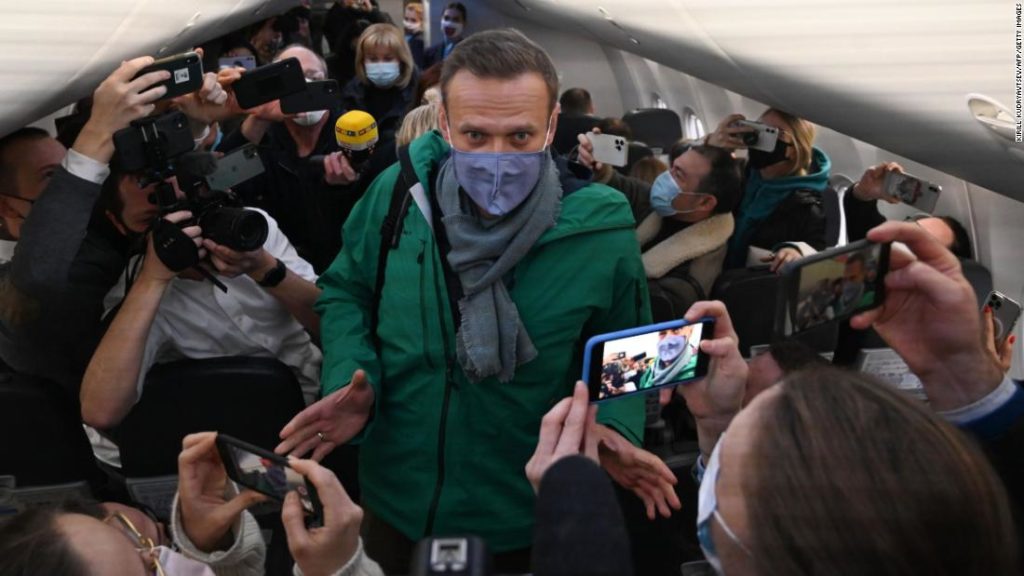Navalny was taken away by police officers at the border without explanation, his spokesperson Kira Yarmysh tweeted. His lawyer, who was also flying in from Berlin, was not allowed to accompany the opposition leader, she said.
Live footage from Russian broadcaster TV Rain showed Navalny talking with dark-uniformed and masked officers at Moscow’s Sheremetyevo airport, then kissing his wife Yulia before walking away with them.
The couple were returning from a five-month stay in Germany, where he had been recovering from the Novichok poisoning. They landed at Sheremetyevo just after 8 p.m. local time (12 p.m. ET), according to flight data information.
“This is the best day in the past five months,” Navalny told journalists at the airport just before his arrest.
“Everyone is asking me if I’m scared. I am not afraid,” he said. “I feel completely fine walking towards the border control. I know that I will leave and go home because I’m right and all the criminal cases against me are fabricated.”
A perennial thorn in Russian President Vladimir Putin’s side, Navalny was placed on the country’s federal wanted list during his convalescence abroad for violating terms of probation related to a years-old fraud case. Navalany dismisses the case as politically motivated.
“Officers … detained Alexey Navalny, who was sentenced to suspended punishment, and who has been on the wanted list since December 29, 2020 for repeated violations of the probationary period. Until the court ruling, he will be in custody, ” said a statement from the Federal Penitentiary Service, according to TASS.
The investigation also found that this unit, which included chemical weapons experts, had followed Navalny on more than 30 trips to and from Moscow since 2017. Russia denies involvement in Navalny’s poisoning. But several Western officials and Navalny himself have openly blamed Russia.
Flight diverted to Sheremetyevo
Navalny had originally been scheduled to land at Vnukovo airport, where a crowd of hundreds of supporters and journalists waited. CNN has been unable to establish why the flight was diverted.
Russian media broadcasts showed police arresting several allies waiting for him at Vnukovo, despite temperatures of around -20 degrees Celsius (-4 degrees F), including politician and lawyer Lyubov Sobol and Ruslan Shaveddinov, who works for Navalny’s Anti-Corruption Foundation.
Navalny’s 2.5-hour flight by Russian carrier Pobeda took off from Berlin Brandenburg Airport on Sunday afternoon. Before departing, he had thanked all the other passengers on his flight, according to a live feed from TV Rain. “Thanks to you all, I hope we will get there fine,” he said. “And I’m sure everything will be absolutely great.”
In an Instagram post on Saturday, Navalny thanked Germany, adding that Germans were “nice, sympathetic, friendly people.”
“Doctors and nurses. Physical therapists and police officers. A lot of cops. The neighbors who invited us to drink, and those who allowed us to rent. Politicians and lawyers. Shopkeepers. Journalists. The prosecutors who interrogated me on requests from Russia. Coaches. Teachers. And even, once, the Chancellor. I had quite a wide circle of friends here. And I can only say a huge thank you to everyone.”
What’s next for Navalny?
Navalny is an outspoken critic of the government and has been detained by Russian authorities many times.
In 2014, he was found guilty of fraud after he and his brother Oleg were accused of embezzling 30 million rubles ($540,000) from a Russian subsidiary of French cosmetics company Yves Rocher. While Navalny was given a suspended sentence, his brother was jailed. Navalny maintains that the case is politically motivated.
FSIN has accused Navalny of violating the terms of his suspended sentence by failing to show up for scheduled inspections, and requested that the court replace his suspended sentence with a real prison term.
A hearing has been scheduled for January 29. If the FSIN request is granted, Navalny will likely be jailed for 3.5 years.
If Navalny is not convicted later in January, he will still face an investigation for a newer fraud case, in which he and his Anti-Corruption Foundation have been accused of misusing donations from supporters.
Putin, who refuses to acknowledge Navalny as a legitimate opponent, has described the extensive media coverage and investigations into the poisoning as a fabrication by Western intelligence, and said in December that if Russian security services had wanted to kill Navalny, they “would have finished” the job.
“The situation with Navalny looks like two trains running towards each other at full speed, bound to collide,” said Tatyana Stanovaya, a visiting fellow, also at the Carnegie Moscow Center. “There will be many victims.”
Attacks on Navalny’s allies have indeed continued. Pavel Zelensky, a cameraman with Navalny’s Anti-Corruption Foundation, was arrested Friday and will be detained until the end of February.
According to Agora, a Russian human rights organization, Zelensky was accused of extremism for tweets from September, in which he blamed the government for journalist Irina Slavina’s self-immolation. Before taking her own life, Slavina blamed pressure from Russian law enforcement for her decision to self-immolate.
CNN’s Claudia Otto and Fred Pleitgen contributed to this report.
You may also like
-
UK coronavirus variant has been reported in 86 countries, WHO says
-
NASA technology can help save whale sharks says Australian marine biologist and ECOCEAN founder, Brad Norman
-
California Twentynine Palms: Explosives are missing from the nation’s largest Marine Corps base and an investigation is underway
-
Trump unhappy with his impeachment attorney’s performance, sources say
-
Lunar New Year 2021: Ushering in the Year of the Ox

